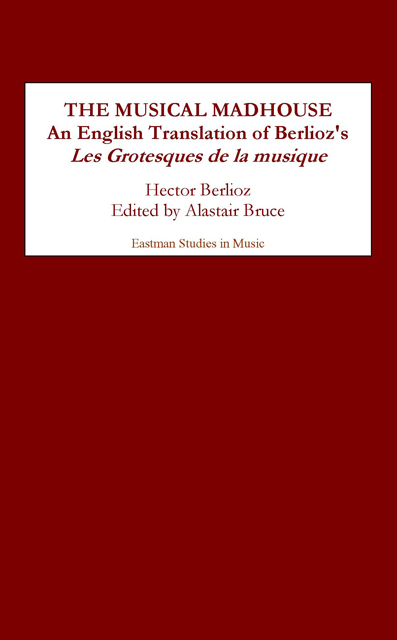Aural aberrations and delusions
Published online by Cambridge University Press: 21 March 2023
Summary
One day, at a concert in which one of Beethoven’s most marvellous violin and piano sonatas, the Kreutzer, was being played, I sat next to a young foreign musician recently arrived from Naples, where, he told me, he had never even heard of Beethoven. The sonata made an impression on him that was both forceful and profoundly disturbing. He was delighted by the andante, in variation form, and the finale. But after listening with almost painful attention to the first movement he said to me:
“That’s very beautiful, isn’t it, Monsieur? Don’t you think so?”
“Yes indeed, it’s beautiful, grand, original, admirable in every way.”
“Well, Monsieur, I must confess I don’t understand it.”
He was both embarrassed and annoyed. This is a bizarre phenomenon that can be observed even among people who have a very good natural ear, but whose musical education is incomplete. It’s impossible to fathom why they find certain pieces incomprehensible; they just don’t understand them. They can’t appreciate the basic idea of the piece, nor its development, nor its mode of expression, nor its accentuation, nor its structure, nor its melodic beauty, nor its harmonic richness, nor its colouring. They simply hear nothing; as far as these pieces are concerned, some people are quite deaf. What’s more, besides completely failing to hear what’s there in abundance, they often think they hear things which aren’t there at all.
One such listener found the theme of an adagio “pale” and “drowned by the accompaniment”:
“Do you like this tune?” I asked him one day, singing a long, slow melodic phrase.
“Oh, it’s delightful, it has such perfect clarity and shape; splendid!”
“Look at the score, then. You see, it’s the adagio whose theme you found ‘pale’. Perhaps seeing it with your own eyes will convince you it can’t possibly be drowned by the accompaniment, since it’s played unaccompanied.”
Another reproached the author of a romance for spoiling its melody with a modulation which was badly timed, harsh, jarring and ill-prepared.
“Dear me!” replied the composer. “Please do me the favour of pointing out this inappropriate modulation; here’s the score—see if you can find it.”
- Type
- Chapter
- Information
- The Musical MadhouseAn English Translation of Berlioz's <i>Les Grotesques de la musique</i>, pp. 104 - 105Publisher: Boydell & BrewerPrint publication year: 2003



